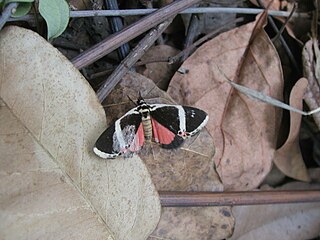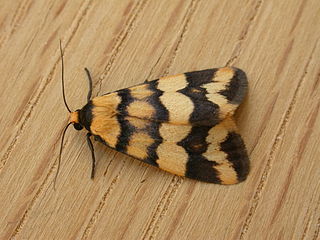
Termessa diplographa is a moth of the subfamily Arctiinae first described by Turner in 1899. It is found in Australia.

Termessa nivosa is a moth of the subfamily Arctiinae first described by Francis Walker in 1865. It is found in the Australian states of New South Wales, South Australia and Victoria.

Termessa shepherdi, the shepherd's footman, is a moth of the subfamily Arctiinae. The species was first described by Newman in 1856. It is found in the Australian states of New South Wales, Victoria and Tasmania.

Termessa is a genus of moths in the subfamily Arctiinae The genus was described by Newman in 1856.

Colbusa is a genus of moths of the family Noctuidae erected by Francis Walker in 1865. There are three species:

Eudocima is a genus of moths of the family Erebidae with numerous tropical species. The genus was first categorised by Gustaf Johan Billberg in 1820, and species currently in the genus have been placed under a range of other genera in the past. Adult moths in the genus are known for puncturing and feeding on the juices of fruits, because of which they are considered as pests by horticulturists.

Mocis is a genus of moths in the family Erebidae. The genus was erected by Jacob Hübner in 1823.

Sideridis is a genus of moths of the family Noctuidae raised by Jacob Hübner in 1821.

Eudocima discrepans is a moth of the family Erebidae first described by Francis Walker in 1858. It is found in the north-eastern part of the Himalayas, western China, Singapore, Thailand and Sundaland.

Termessa zonophanes, the double yellow-patched footman, is a moth of the subfamily Arctiinae. The species was first described by Edward Meyrick in 1888. It is known from the Australian Capital Territory, New South Wales, Queensland and Victoria.
Termessa catocalina is a moth in the subfamily Arctiinae. It was described by Francis Walker in 1865. It is found in Australia, where it has been recorded from New South Wales and Victoria.
Termessa congrua is a moth in the subfamily Arctiinae. It was described by Francis Walker in 1865. It is found in Australia, where it has been recorded from New South Wales and Queensland.
Termessa conographa is a moth in the subfamily Arctiinae. It was described by Edward Meyrick in 1886. It is found in Australia, where it has been recorded from New South Wales and Queensland.
Termessa gratiosa is a moth in the subfamily Arctiinae. It was described by Francis Walker in 1865. It is found in Australia, where it has been recorded from the Australian Capital Territory, New South Wales, Queensland and Victoria.
Termessa laeta is a moth in the subfamily Arctiinae. It was described by Francis Walker in 1856. It is found in Australia, where it has been recorded from the Australian Capital Territory, New South Wales, Queensland, South Australia, Victoria and Western Australia.
Termessa orthocrossa is a moth in the subfamily Arctiinae. It was described by Turner in 1922. It is found in Australia, where it has been recorded from New South Wales and Queensland.
Termessa xanthomelas is a moth in the subfamily Arctiinae. It was described by Oswald Bertram Lower in 1892. It is found in Australia, where it has been recorded from the Australian Capital Territory, New South Wales, Queensland, South Australia and Victoria.
Desmia discrepans is a moth in the family Crambidae. It was described by Arthur Gardiner Butler in 1887. It is found in Papua New Guinea and on the Solomon Islands. It is also found in Australia, where it has been recorded from Queensland.








